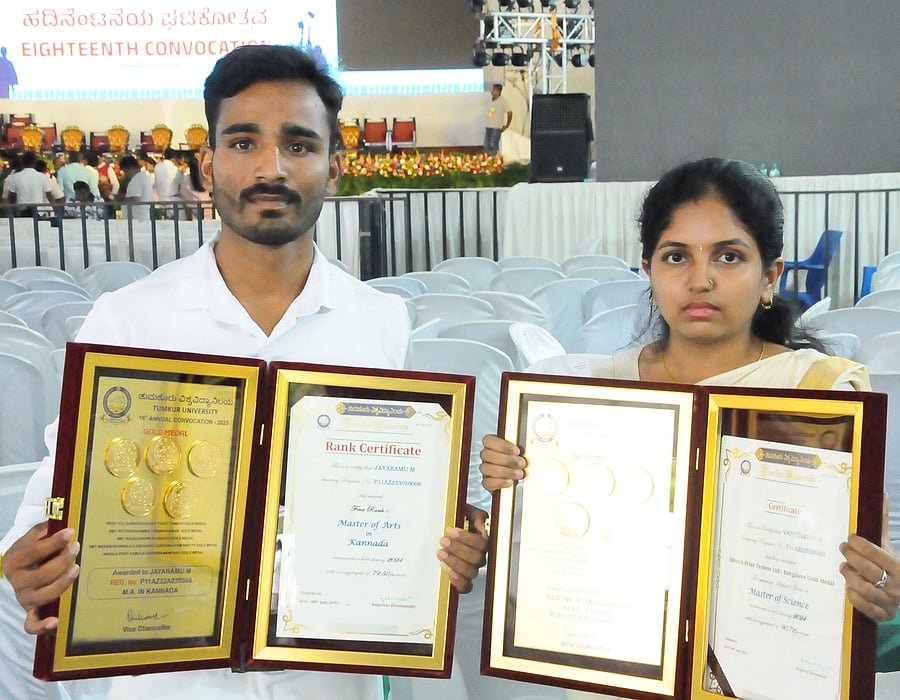
M Jayaramu and H R Vaishnavi, who bagged five gold medals in their respective subjects, during Tumkur University convocation.
Credit: DH Photo
Tumakuru: As five years have passed since the implementation of the National Education Policy (NEP), India needs to establish at least 500 new universities in the next decade to ensure wider access to higher education, said All India Council for Technical Education (AICTE) Chairman T G Sitharam.
Delivering the 18th convocation address at Tumkur University on Tuesday, Prof Sitharam highlighted the significant progress in the higher education sector under NEP.
“For two decades, the Gross Enrollment Ratio (GER) in higher education remained below 18%. However, since the implementation of NEP, more students have begun pursuing higher education. Earlier, Arts students had no access to Science subjects, and vice versa. Now, students can choose inter-disciplinary courses, which mark a revolutionary shift in the education system,” he said.
Prof Sitharam noted that India has emerged as the fourth-largest economy in the world, and this growth has been possible due to a strong foundation in higher education. He emphasised that achieving the goal of ‘Viksit Bharat’ (developed India) by 2047 would be possible only through strengthening the higher education system.
Recalling India’s advancements in science and technology, he praised the country’s achievements in space exploration, defence technology, medical sciences, and digital technologies. He also pointed out that recent strategic successes, including operations against Pakistan, were enabled by technological superiority.
'Cultivate essential human qualities'
“As India stands at the threshold of the fourth industrial revolution, emerging technologies like artificial intelligence (AI), machine learning, quantum computing, and cybersecurity are set to shape the future of the world. But while AI is powerful, it lacks essential human qualities such as empathy, values, ethics, and judgment. These are traits unique to humans, and students should cultivate such values alongside technological advancement," he added.
Governor Thawar Chand Gehlot, who presided over the event, said, “A well-educated nation must be built through education. Making education accessible to all is the key to realising the vision of a developed India.”
He also appreciated Tumkur University for providing mid-day meals at its constituent degree colleges, calling it a model initiative that should inspire other universities.
On the occasion, veteran journalist S Naganna, renowned writer Hampa Nagarajaiah (Hampana), and entrepreneur Dileep Surana received honorary doctorates in recognition of their outstanding contributions to their respective fields.
Degrees awarded
Degrees were awarded to 11,349 students, including 1,911 postgraduates and 9,438 undergraduates. As many as 76 meritorious students bagged 106 gold medals. In addition, two D Litt degrees and 59 PhD degrees were awarded.
Vice-Chancellor M Venkateshwarlu presented the annual report. Registrar (Administration In-charge) M Kotresh and Registrar (Evaluation) Sathish Gowda N were present on the occasion.
From herding sheep to winning gold
“I grew up in such poverty that we couldn’t afford even one proper meal a day. While herding sheep, I dreamt of education—and today, I have achieved it.”
These emotional words came from M Jayaramu from Tumkur University’s Postgraduate Kannada Department after he won five gold medals during the university’s 18th convocation held on Tuesday. Amid joy and pride, Jayaramu shared his moving story of struggle and success.
A resident of Gollarahatti in Mallenahalli village, Jayaramu hails from a background of extreme poverty. With no father, he credits his mother—who worked as a daily wage labourer—for his entire education. “She is everything to me,” he said with gratitude.
“I dedicate my achievement to all students from underprivileged backgrounds. I have faced great hardships and pain, but amidst it all, I have earned this success,” Jayaramu said.
Jayaramu completed his undergraduate course at the University Arts College and his postgraduate course in Kannada at the university. He is now working as a principal at a private first-grade college. He intends to continue in the teaching profession.
Gold medals in Mathematics
H R Vaishnavi of the Mathematics Department also secured five gold medals. Humbly crediting her success to her parents and teachers, she said, “Their constant support helped me reach this milestone.”
Vaishnavi is from Holavanahalli village in Koratagere taluk. Her father is an ex-serviceman, and the family’s support played a key role in her academic journey.
“It is not about how much we study, but how well we understand what we learn. That makes all the difference,” she said, adding she too aims to pursue a career in teaching.
